Related Research Articles
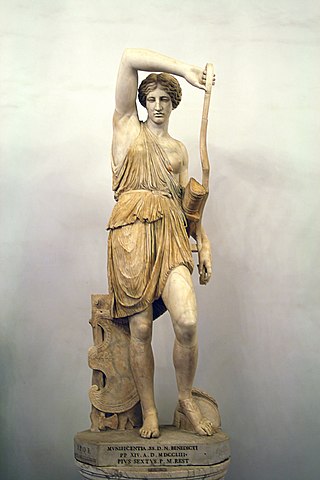
The Amazons were a people in Greek mythology, portrayed in a number of ancient epic poems and legends, such as the Labours of Heracles, the Argonautica and the Iliad. They were female warriors and hunters, known for their physical agility, strength, archery, riding skills, and the arts of combat. Their society was closed to men and they raised only their daughters and returned their sons to their fathers, with whom they would only socialize briefly in order to reproduce.

Theseus was a divine hero in Greek mythology, famous for slaying the Minotaur. The myths surrounding Theseus, his journeys, exploits, and friends, have provided material for storytelling throughout the ages.

In Greek mythology, Hippolyta, or Hippolyte, was a daughter of Ares and Otrera, queen of the Amazons, and a sister of Antiope and Melanippe. She wore her father Ares' zoster, the Greek word found in the Iliad and elsewhere meaning "war belt". Some English translations prefer "girdle". Hippolyta figures prominently in the myths of both Heracles and Theseus. The myths about her are so varied it is thought that they may be about different women. The name Hippolyta translates as "she who unleashes the horses", deriving from two Greek roots meaning "horse" and "let loose".
In Greek mythology, Otrera was the founder and first Queen of the Amazons; the consort of Ares and mother of Hippolyta and Penthesilea. She is credited with being the founder of the shrine of Artemis in Ephesus.
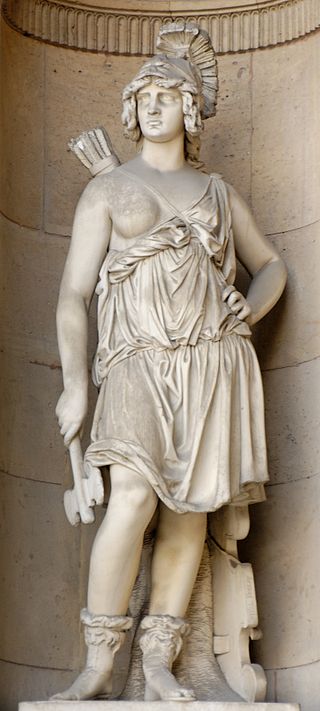
Penthesilea was an Amazonian queen in Greek mythology, the daughter of Ares and Otrera and the sister of Hippolyta, Antiope, and Melanippe. She assisted Troy in the Trojan War, during which she was killed by Achilles or Neoptolemus. The asteroid 271 Penthesilea, discovered in 1887, was named in her honor.
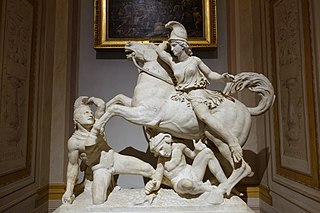
In Greek mythology, an Amazonomachy is a mythological battle between the ancient Greeks and the Amazons, a nation of all-female warriors. The subject of Amazonomachies was popular in ancient Greek art and Roman art.
In Greek mythology, Molpadia may refer to the two different women:

In Greek mythology, Antiope was an Amazon, daughter of Ares and sister to Melanippe, Hippolyta, Penthesilea and possibly Orithyia, queens of the Amazons. Two sisters, Orithyia and Antiope, co-ruled the Amazons. Antiope may have been the wife of Theseus and mother to his son Hippolytus of Athens, but differing sources claim this was Hippolyta.

Themyscira is a fictional unitary sovereign city-state and archipelagic island nation appearing in American comic books published by DC Comics. Previously known as Paradise Island and the Amazon Isles, it first appeared in All Star Comics #8.

Queen Hippolyta is a superhero appearing in American comic books published by DC Comics, based on the Amazon queen Hippolyta from Greek mythology. Introduced in 1941 during the Golden Age of Comic Books, she is the misandrist queen of the Amazons of Themyscira, the mother of Wonder Woman, and in some continuities, the adopted mother of Donna Troy.
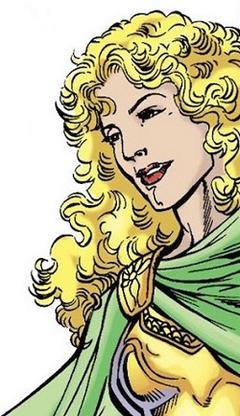
Antiope is a fictional character appearing in American comic books published by DC Comics, usually as a supporting character in stories featuring Wonder Woman and the Amazons of Paradise Island/Themyscira. Created by writer Dan Mishkin and visualized by artist Don Heck, she first appeared in Wonder Woman #312, and is based on the mythological Antiope, one of the mythological Amazons.

By Jupiter is a musical with a book by Lorenz Hart and Richard Rodgers, music by Rodgers, and lyrics by Hart. The musical is based on the play The Warrior's Husband by Julian F. Thompson, set in the land of the Amazons. By Jupiter premiered on Broadway in 1942 and starred Ray Bolger, and was the last musical written by Rodgers and Hart; when Hart’s erratic behavior was often the cause of friction between him and Rodgers and led to a breakup of their partnership the following year before his death. Rodgers then began collaborating with Oscar Hammerstein II.
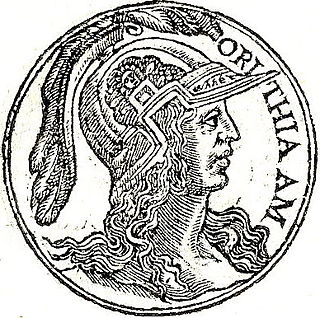
In Greek and Roman legendary history, Orithyia, "woman raging in the mountains", was the daughter of Marpesia.

Themiscyra was an ancient Greek town in northeastern Anatolia; it was situated on the southern coast of the Black Sea, near the mouth of the Thermodon, probably at or near modern Terme.

Philippus is a fictional character created by DC Comics. She made her first appearance in February 1987 as an Amazon character in the Wonder Woman comic book. The character was created by writer/artist George Pérez.

War Goddess is a 1973 adventure film directed by Terence Young and starring Alena Johnston, Sabine Sun, Rosanna Yanni, Helga Liné, and Luciana Paluzzi. It was a co-production between Italy, France, and Spain.

The Sword Is Forged is a 1983 historical fiction novel by Evangeline Walton. It is based on the story of Theseus and the Amazon queen Antiope from Greek mythology.
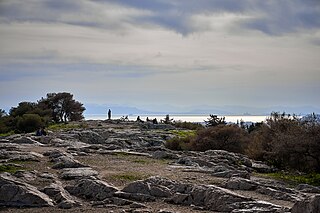
Melite was a deme of ancient Attica, located in the city centre of Athens, within the walls erected by Themistocles and to the west of the Acropolis. It included the Agora and the Pnyx. It belonged to the tribe of Kekropis.
References
- ↑ Kuiper, Kathleen. "Amazon". Britannica. Retrieved 5 December 2023.
- ↑ Plutarch. "Parallel lives, Vol 1. Life of Theseus". www.gutenberg.org. Retrieved 2022-10-09.